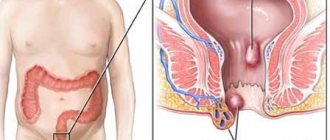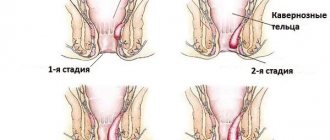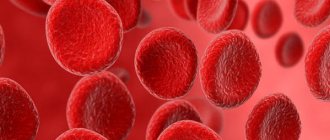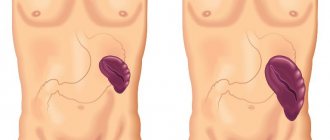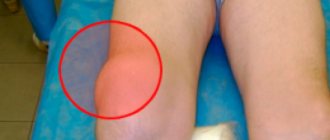Hemorrhoids are a delicate problem that you don’t want to talk about out loud! Therefore, you endure in the hope of a miraculous recovery, anonymously browse all kinds of forums and read articles about miracle drugs that will overcome this illness. In the meantime, you are far from alone, and this disease is not something shameful. According to statistics, about 80% of the adult population of megacities suffers from hemorrhoids. Our way of life sometimes costs us a lot. It is we who provoke our body with our “sedentary work”, irregular and unhealthy diet, uncontrolled use of medications, alcohol abuse, etc. Heredity also plays a significant role. Unfortunately, pregnancy and childbirth also significantly increase our chances of developing this disease.
However, everything is not so hopeless, because over a long time of fighting hemorrhoids, medicine has accumulated a significant arsenal of drugs for its treatment.
Causes
Provocateurs of hemorrhoids during pregnancy are:
- the uterus, which puts pressure on the vessels, reducing their tone and stretching them. This happens due to an increase in its size;
- constipation They are provoked by the pressure of the uterus on the intestines;
- sedentary lifestyle. The outflow of venous blood worsens, which provokes the appearance of hemorrhoids;
- change in tastes. Eating salty, sweet foods, which is an intestinal irritant;
- excess weight;
- hormonal changes.
In the first trimester
Pregnant women rarely encounter hemorrhoids in the first trimester. At this stage, the disease is largely asymptomatic. This is where its danger lies, because a woman begins treatment when the disease has already begun to cause a lot of inconvenience and anxiety.
In the second trimester
In the second trimester of pregnancy, hemorrhoids develop for a number of reasons.
The hormone progesterone plays an important role. After conception, the amount in the body increases significantly, which affects the structure and tone of muscle cells. They relax, and with them the intestinal walls. Therefore, the woman regularly suffers from constipation.
In the third trimester
In later stages of pregnancy, a woman is less mobile than in the first two trimesters. She experiences muscle weakness, often swelling, and her blood pressure may be elevated. In this regard, expectant mothers prefer to rest more. Due to low activity, blood stagnation occurs, which leads to swelling of the vascular nodes. The uterus, which has increased in size by the third trimester, puts pressure on the inferior vein, disrupting normal blood flow in the pelvis and rectum.
Does it always appear after childbirth?
Hemorrhoids may not appear at all, or may become more active immediately after childbirth, since during pushing the pressure on the venous walls increases sharply, and hemorrhoids form.
Diet: problem solution or maintenance therapy?
One of the main physiological reasons for the development of hemorrhoids is regular constipation, since in this case feces increase pressure on the rectum in general and its vessels in particular. The result is a local circulatory disorder and the appearance of internal hemorrhoids.
At the initial stage, conservative medical treatment is carried out, as well as a diet is prescribed to treat one of the main causes - constipation. The diet is prescribed taking into account the natural data, the health of the patient and with the aim of eliminating from the diet foods that can cause inflammation and irritation of the intestines (especially the rectum).
What are the types of hemorrhoids during pregnancy?
There are two types of hemorrhoids during pregnancy: internal and external.
The internal one is less painful. Hemorrhoids are located inside the anus. The woman feels heaviness in the anus and suffers from constipation.
The external form of manifestation of the disease is much more dangerous. In addition to discomfort, a pregnant woman experiences severe pain. Inflammation of the nodes leads to their falling out, burning and itching is felt. All this causes great discomfort and a lot of pain.
What does the inside look like?
It is not easy to identify hemorrhoids at the internal stage. The size of hemorrhoids is small, and a woman may not even be aware of their presence. Over time she will observe:
- slight discomfort,
- spotting on toilet paper after bowel movements,
- sensation of a foreign object in the rectum,
- itching and burning in the anal area.
The pregnant woman does not pay attention to these symptoms, and hemorrhoids often progress to the next stage.
Outer
At this stage, hemorrhoidal bumps appear around the anus. A woman may experience heavy bleeding, while feeling pain during bowel movements, severe itching, and burning. It is possible to cure external hemorrhoids with the help of medications.
Only a doctor should make a diagnosis and prescribe medications for treatment.
Spicy
With this form of the disease, a blood clot forms in the veins of the rectum. This causes severe pain. They worsen immediately after emptying, external nodes up to several centimeters in size are formed. The skin underneath becomes very red and swollen.
Chronic
If you do not react in any way and do not treat hemorrhoids, literally after a few days the disease will smoothly pass into the chronic stage. Hemorrhoids swell only when stressed. In addition, the woman is bothered by severe itching and burning. The nodes fall out, and it is impossible to set them back without the involvement of third parties. With chronic hemorrhoids, it is very difficult for a pregnant woman to walk and sit. There are various medications that can relieve inflammation, but there is a high probability that with repeated certain actions, it will worsen again.
Forms of the disease
Hemorrhoids can be acute or chronic.
Depending on the location of pathologically altered hemorrhoids, the following forms of the disease are distinguished:
- internal (or submucosal) hemorrhoids;
- external (or subcutaneous, external);
- mixed (combined).
With internal hemorrhoids, the nodes are located inside the anal canal and are not visible from the outside
How to treat with medication
Drug treatment is determined by the doctor, taking into account the characteristics of the pregnancy and possible concomitant diseases of the woman.
1st trimester
In the first month of pregnancy, all the main organs of the baby are formed, so taking medications is not recommended. If a woman has hemorrhoids, she should definitely consult a doctor. He will prescribe a comprehensive treatment, including the use of:
- ointments;
- creams;
- candles;
- folk methods.
Surgical intervention by a specialist is left for the period after childbirth.
Treatment in the first trimester of pregnancy involves the use of suppositories, for example, Natalsid. They can be used from the first weeks of pregnancy. Candles perfectly fight inflammation, bleeding, and are used for the internal form of the disease.
You can use sea buckthorn suppositories. They perfectly heal small wounds, cracks, relieve itching, burning, and inflammation.
Also, for hemorrhoids in the first trimester of pregnancy, you can use Vishnevsky or Fleming ointment. With the help of these drugs, you can really get rid of the severe symptoms of hemorrhoids, reduce the size of the nodes, and also reduce pain.
2nd trimester
During the second trimester, hemorrhoids can be treated with the following medications:
- "Anuzol".
- "Natalsid."
- "Betiol."
- Simple suppositories containing methyluracil, propolis or ichthyol.
It is recommended to use the above remedies strictly after consultation with a proctologist, since they contain hormones.
3rd trimester
Very often, hemorrhoids worsen in the third trimester of pregnancy. This is due to an increase in intrauterine pressure. It is created by the baby, intensively developing and gaining mass. The disease progresses due to compression of the intestines. The solution will be the use of such drugs: “Proctosan”, “Posterizan”, “Troxevasin”.
The disease cannot be ignored. During this period, the body is actively preparing for childbirth and should not be allowed to waste it on inflammatory processes.
Can it be removed during pregnancy?
Hemorrhoids may require surgery in the third trimester. Today there are more gentle methods:
- sclerotherapy;
- cauterization;
- latex rings.
Possible complications and consequences
In addition to deteriorating the overall quality of life, hemorrhoids can complicate the normal course of pregnancy, affect the progress of childbirth, and also reduce a woman’s well-being in the postpartum period.
Hemorrhoids during pregnancy can be complicated by such serious conditions as thrombosis, strangulation and necrosis of hemorrhoids, as well as purulent inflammation of the tissues surrounding the anal canal. The addition of a bacterial infection is fraught with intrauterine infection of the fetus.
Constant bleeding from hemorrhoids causes anemia, which, in turn, negatively affects the condition of the pregnant woman and the fetus.
How to treat at home: recipes and remedies
The symptoms of hemorrhoids can be eliminated at home. So, the solution would be:
- baths;
- vegetable suppositories;
- compresses;
- ice candles.
To prepare the bath, pour 1 liter of boiling water over dry chamomile and plantain. Then let it brew for a while. You need to take a bath for about 15 minutes. The temperature should not be more than 36 degrees.
Some herbs should not be used by pregnant women. They can cause a miscarriage.
Vegetables can be used as a folk remedy. Potatoes and carrots are perfect; the candle should be administered at night, after lubricating the vegetable with honey or oil.
An ice compress made from pieces of ice can be applied to prolapsed inflamed nodes. They need to be wrapped in soft cloth in advance.
To prepare ice candles, you will need herbal infusions, which are frozen. Then a small piece of ice should be inserted into the rectum. The procedure is usually performed before bedtime. This folk remedy perfectly relieves swelling and pain, and also greatly facilitates the process of defecation.
Prevention
If you have the slightest signs of the disease, you should immediately contact a proctologist. To prevent the disease, experts advise adhering to the rules.
Nutrition
You need to eat right. It is necessary to exclude the consumption of fried, salted, smoked foods, and include fermented milk products in the diet.
Hygiene
It is extremely important to wash yourself after going to the toilet. It is advisable to use baby soap and special gels without harmful additives and fragrances for hygiene purposes.
Gymnastics
Strong physical activity during pregnancy causes harm to both mother and baby. To prevent hemorrhoids, a woman should do at least a minimum of exercise. It is advisable to consult a gynecologist and proctologist before starting classes.
Recommended Products
For hemorrhoids, nutritionists advise paying special attention to the amount of vegetables and fruits in the diet, not forgetting cereals. The reason is that all these foods contain a large amount of fiber, which prevents constipation. We have compiled for you a list of products that must be present in your diet if your problem is hemorrhoids.
This is what nutrition should look like to prevent hemorrhoids
- Vegetables and fruits. They should be present in large quantities, as it is a natural source of fiber and vitamins, so necessary for expectant mothers. You can eat such products both raw and cooked. When choosing vegetables and fruits, you should give preference to seasonal products, as this will guarantee that they were grown without additional growth stimulation. In winter, dried fruits are a good choice - figs, dried apricots, and so on.
- Cereals. They are one of the most accessible and cheapest products on our market, and therefore will not be superfluous on the table of any pregnant woman. They are rich in fiber, and therefore can be used to prevent constipation. Nutritionists advise paying attention to cereals such as buckwheat, barley and oatmeal.
- Meat and fish. During pregnancy, the body absolutely needs animal protein, which we can only take from meat and fish of various origins. To ease the load on the stomach and intestines, such products should be prepared by steaming, oven or boiling.
What not to do for hemorrhoids during pregnancy
If you have hemorrhoids during pregnancy, a woman should not:
- overexert yourself too much;
- stay in one position for a long time;
- ignore daily walks in the fresh air;
- eat large quantities of baked goods, legumes, pasta;
- wear synthetic underwear;
- use leggings with a tight elastic band;
- go to the pool, sauna, take a warm bath;
- sit on the toilet for a long time and strain too hard during bowel movements;
- use laxatives.
Hemorrhoids are not a death sentence. The disease is treated with medication. In resolving this issue, it is important to see a proctologist in a timely manner, and following the recommendations will help not only get rid of hemorrhoids, but also avoid recurrence. To combat the disease, it is useful to do exercises, hypothermia should not be allowed, and it is necessary to improve the functioning of the intestines.
Undesirable foods in the diet
Eating certain foods can lead to the development of diseases and problems not only in the gastrointestinal tract, but also in the cardiovascular system. The main reason is an excess of simple carbohydrates and salt in food, which lead to the formation of cholesterol plaques.
The following products are not recommended for consumption during a diet for hemorrhoids:
- fatty and spicy foods;
- ketchup and mayonnaise (even homemade!);
- white bread, pasta, pastries and other flour products.
